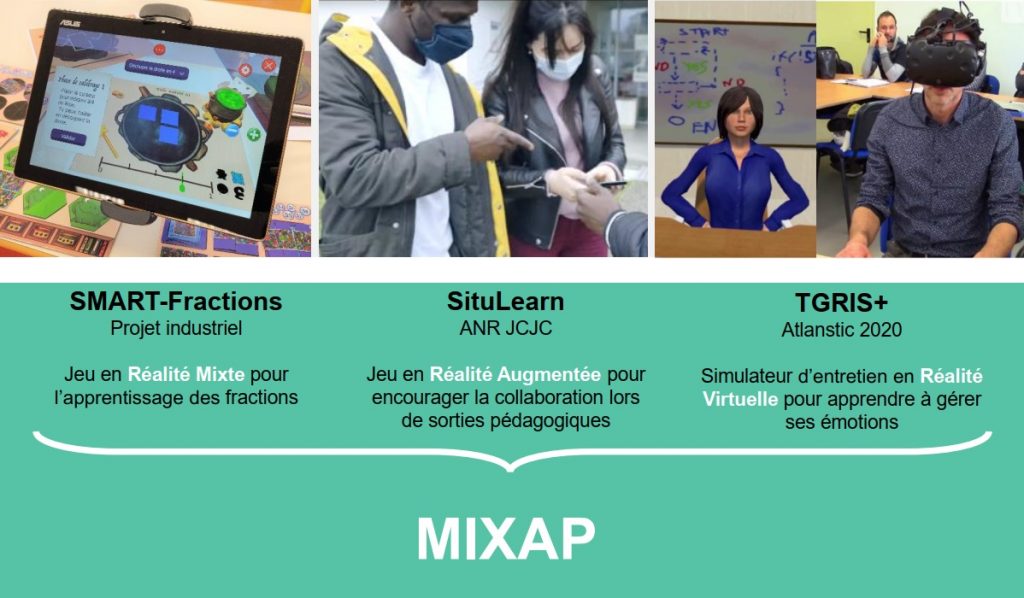Design and Development of Authoring Tools that Enable Teachers to Create their Custom Extended Reality Applications
Research Laboratory
Laboratoire d’Informatique de l’Université du Mans (LIUM)
Technology Enhanced Learning Team
Location of the Post-Doctorat
IUT de Laval – Bâtiment CERIUM2
52 rue des docteurs Calmette et Guérin, 53020 Laval
France
Supervisor
Iza MARFISI (iza.marfisi@univ-lemans.fr)
Dates
From the 15th of March 2022 to 15th of August 2023 (18 months)
Keywords: Extended Reality, Mixed Reality, Augmented Reality, authoring tools, Human-Computer Interactions, Technoplogy Enhanced Learning.
Description of the research subject
EXtended Reality (XR) represents the wide spectrum of innovative Human-Computer Interactions (HCI) ranging from Augmented Reality to Virtual Reality. XR potentially offers numerous advantages in terms of learning, collaboration and motivation. However, the creation of such applications is too complex for teachers, in terms of design and development. Ideally, their creation involves a team of experts including at least a teacher, a programmer specialized in XR, a graphic designer and, if possible a game designer and a UX designer to create engaging and fun learning experiences. This team needs to imagine a scenario that supports learning and design XR interactions that are adapted to the pedagogical objectives, the learners and the context in which they will be used. However, it is very rare for schools to be able to hire such a team, and teachers often need to go through this process alone.
The MIXAP project, in which the postdoc will take place, aims to provide methods and authoring tools to help teachers create their own XR applications, in order to take advantage of their numerous pedagogical advantages. It is financed by Le Mans University and the Pays de la Loire Region, as part of the “Etoile Montante” program.
The postdoc will be able to build on 3 current projects conducted at LIUM:
- SMART-Fractions : a Mixed Reality game for learning fractions
- SituLearn : a project that offers tools to support collaborative learning and the follow-up of students during field trips
- TGRIS : a Virtual Reality interview Simulator to learn how to deal with emotionally intense situations
The objective is to analyze these applications to determine generic models that could be used in other educational contexts. Following the Design-Based Method involving local schools, the postdoc will then design and develop the authoring tools so that any teacher can design their own custom XR applications.

References
- Scharf, T. Winkler, et M. Herczeg, « Tangicons: Algorithmic Reasoning in a Collaborative Game for Children in Kindergarten and First Class », in Proceedings of the International Conference on Interaction Design and Children, New York, NY, USA, 2008, p. 242‑249.
- da costa, N. Szilas, et A. Müller, « Réalité augmentée pour l’apprentissage conceptuel en sciences : quels principes de conception pour les EIAH ? Cas du dispositif DEAPE Learn en électromagnétisme », in Actes d’Environnements Informatiques pour l’Apprentissage Humain, EIAH, Paris, France, 2019, p. 181‑192.
- Palaigeorgiou, X. Tsolopani, S. Liakou, et C. Lemonidis, « Movable, resizable and dynamic number lines for fraction learning in a mixed reality environment », 2018.
- Radu, B. McCarthy, et Y. Kao, « Discovering educational augmented reality math applications by prototyping with elementary-school teachers », in Proceedings of the IEEE Virtual Reality conference, Greenville, USA, 2016, p. 271‑272.
- Roberto, J. Paulo Lima, R. Mota, et V. Teichrieb, « Authoring Tools for Augmented Reality: An Analysis and Classification of Content Design Tools », 2016, vol. 9748, p. 237‑248
- Marfisi-Schottman, I. Vinatier, et E. Bevacqua, « TGRIS : Outil de simulation pour la gestion des émotions dans la formation à l’entretien des conseillers pédagogiques », in Environnements Informatiques pour l’Apprentissage Humain (EIAH19), Paris, France, juin 2019, p. 307‑318
- Iza Marfisi-Schottman, Sofiane Touel, Sébastien George. Designing a Mixed Reality Extension for an Educational Board Game on Fractions. International journal of virtual reality, Arts et Métiers Institute of Technology, 2021, 21 (1).
Candidate profile
We are looking for a researcher who holds a PhD in the field of Computer Science, with experience in Technology Enhanced Learning and Innovative Human Computer Interactions.
The candidate must have defended his PhD less than 3 years before the beginning of the Postdoctorate (after the 15th of February 2019).
The candidate is not required to speak French although it would be an advantage to communicate with the local teachers during the co-design and testing phases.
Salary and other benefits
The postdoc will earn 2 849.10 € BRUT/month.
The project also involves a 2-week research visit in a partner lab, in Canada or Japan.

 English
English